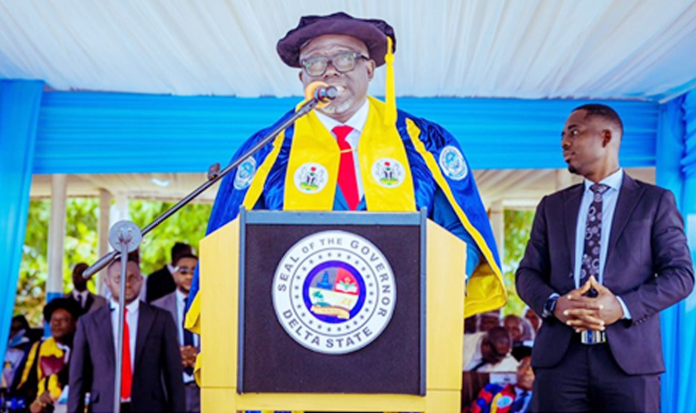BY SAM DUVWODE/ IFEANYI UWAGWU/JUMAI NWACHUKWU
THE Delta State Governor, Rt Hon. Sheriff Oborevwori, has charged the Joint Consultative Committee on Education (JCCE) and other stakeholders to formulate policies that will elevate the nation’s educational system to new heights, driving equity and socio-economic prosperity.
Oborevwori made the call during the opening ceremony of 84th Plenary Meeting of JCCE, themed “Quality Education Data and Professionalization of Teaching: Tools for Enhanced National Development”, held at Jace Darl Hotel and Suites Conference Centre in Asaba, the Delta State capital.
Represented by his deputy, Sir Monday Onyeme, the governor welcomed participants to the state, noting that Delta was honoured to host a forum where collaboration, innovation, and shared purpose converge to refine educational policy and practice in Nigeria.
“This seminar is not merely a convening; it is a catalyst for action rooted in partnership and the pursuit of excellence. I invite all participants to engage deeply, contribute thoughtfully, and challenge assumptions as we explore how data-driven insights and a professional group of teachers can propel national development”, the Governor said.
He noted that the JCCE was playing a pivotal role in shaping the future of education in Nigeria, serving as a platform for thorough deliberation, thoughtful refinement, and strategic alignment of policies with national aspirations.
According to the governor, the theme of the forum was apt and timely, as one of the major drawbacks in Nigeria’s development journey had been the absence of accurate and reliable data, particularly in the education sector. He stressed that without credible data, it was impossible to make informed decisions, execute targeted interventions, or allocate resources judiciously for sustainable development.
“Delivering quality education, largely dependent on teaching excellence, is impossible without robust data collection and analysis. These are critical for effective decision-making, identifying gaps, educational innovation, and ultimately, better student outcomes,” he said.
Governor Oborevwori noted that the synergy between data and the professionalism of teaching is indispensable. He explained that when teachers are equipped with the knowledge and tools to interpret and apply educational data, their effectiveness increases, translating into improved student performance.
He reiterated the Delta State Government’s commitment to providing the highest quality education in a safe and supportive environment. He said the administration remained focused on equipping students with the right tools to become global leaders, with strong emphasis on science, vocational, and technical education.
“To achieve this “we have continued to prioritise the training and retraining of teachers. This is why the Teachers’ Professional Development Centre, established in 2016, remains functional. It provides regular in-service training for both new and experienced teachers, empowering them with data tools and skills to enhance teaching outcomes.”
He encouraged participants to use the plenary to develop practical strategies that will enhance digital systems, communication, and accountability in the education sector.
Governor Oborevwori expressed hope that the deliberations at the plenary would yield impactful outcomes, resulting in policy decisions that will position Nigeria for academic excellence, equity, and economic growth.
In his address, the Minister of Education, Dr Tunji Alausa, represented by the Permanent Secretary of the Ministry, Mr Abel Enitan, underscored the importance of leveraging high-quality education data and advancing the professionalization of teaching as strategic tools for national development. He commended Delta State for its commitment to education, while highlighting key federal initiatives such as the Nigerian Education Data Initiative (NEDI), which has established a unified national education database to eliminate data fragmentation and support reliable policy planning.
Enitan revealed that under the Nigerian Education Sector Renewal Initiative (NESRI), the Ministry has prioritised robust data architecture and strengthened education management information systems.
He also noted reforms in the teaching profession, including national certification standards implemented by the Teachers Registration Council of Nigeria (TRCN), as well as in-service and distance learning programmes delivered through the National Teachers Institute (NTI). These reforms, he said, were already improving learning outcomes and positioning the education sector to contribute more meaningfully to national development.
Speaking further, Mr Enitan outlined strategic priorities for the plenary meeting, urging participants to adopt technology-driven solutions in education data management and to commit to continuous professional development (CPD) for teachers. He stressed the need to integrate digital tools in pedagogy, establish clear career pathways for educators, and enhance teacher welfare through competitive salaries and incentives. “A well-trained, motivated, and professional teaching workforce will improve student outcomes and help produce a globally competitive workforce,” he said.
Earlier, the State Commissioner for Higher Education, Prof Nyerwhovwo Tonukari, welcomed dignitaries to the plenary session. He called on them to engage deeply, contribute thoughtfully, and challenge assumptions to explore how data-driven insights and professional growth for teachers can propel national development.
One of the highlights of the event was the presentation of the Strategic Roadmap for Technical Education in Delta State from 2026-2030, by the Commissioner for Technical Education, Mr Smart Ufoh.
Other dignitaries present at the session include the State Commissioners for Secondary and Primary Education, Mrs Rose Ezewu and Dr Kingsley Ashibuogwu, respectively, the Secretary to the State Government (SSG), Dr Kingsley Emu, and other federal and state education commissioners, directors, education stakeholders, and development partners committed to reshaping Nigeria’s educational landscape through innovation and professionalism.


